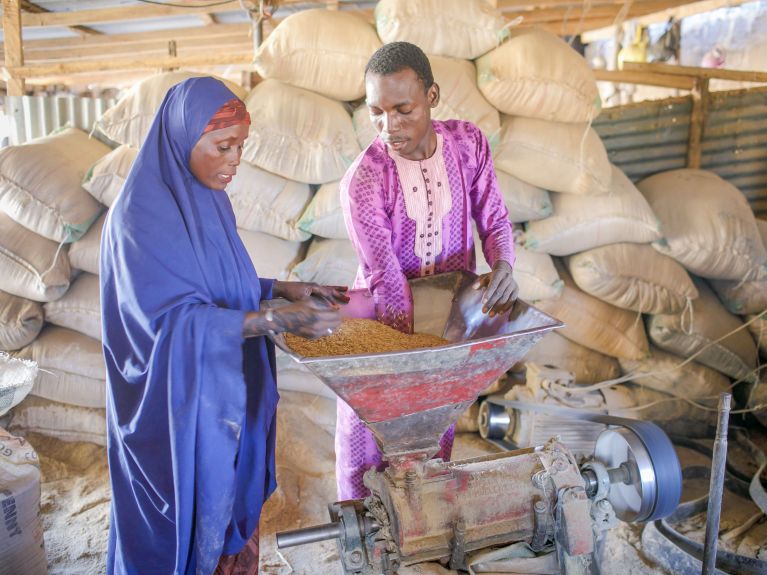Showing solidarity worldwide
1.6 billion people and 94 countries are affected by the Ukraine war. What Germany is doing to help.

Thousands of sacks of grain are piled many metres high, and the air in the huge hall is stuffy. The grain warehouse on the outskirts of Adama, almost 100 kilometres from the Ethiopian capital Addis Ababa, is the country’s largest run by the United Nations World Food Programme.
Dieses YouTube-Video kann in einem neuen Tab abgespielt werden
YouTube öffnenThird party content
We use YouTube to embed content that may collect data about your activity. Please review the details and accept the service to see this content.
Open consent formWhen German Foreign Minister Annalena Baerbock visited the grain storage facility together with her French counterpart Catherine Colonna in January 2023, she also took a look at two big maps attached to the wall. They pinpoint where in the country the grain is being transported and where the drought – and thus the famine that people are suffering – is particularly bad.

According to the charity Welthungerhilfe, around 22 million people in Ethiopia have too little to eat. One reason for the critical humanitarian situation in the country is Vladimir Putin’s war of aggression against Ukraine, as it has caused prices of wheat and other basic foods to skyrocket.
The Russian president is using grain as a weapon.
“The Russian president is using grain, is using food as a weapon,” Baerbock said during her visit. “This is exacerbating the dramatic food supply situation worldwide because droughts have also continued to increase in the world.”
Ukraine and Ethiopia may be thousands of kilometres apart, yet the extent to which the latter is affected by the war is terrible. According to a UN report, around 1.6 billion people and 94 countries are affected in at least one way or another by the crisis in food, energy and financial systems. Germany is taking international action on many different levels in a bid to mitigate the serious consequences of the conflict. Together with France, for example, Germany helped Ukraine donate grain to Ethiopia by funding and organising the shipment.
Commitment to UN World Food Programme
In total, Germany stepped up its contributions to the UN World Food Programme to more than 1.7 billion euros in 2022, and is globally committed to increasing food security. In November 2022, the German government announced that it would be making an additional 1 billion euros available before the year was out to help the fight against hunger in the world. Germany is supporting the Secretary-General of the United Nations with his “Global Crisis Response Group on Food, Energy and Finance“ (GCRG) initiative. The GCRG develops global solutions to issues relating to food, energy and financial security. Partners at the G7 summit hosted by Germany in 2022 also voted on joint solutions and launched the Global Alliance for Food Security, which follows on from the United Nations initiatives. At their summit at Schloss Elmau in Bavaria, the G7 states pledged to provide a further 4.5 billion US dollars for global food security.

One country that borders Ukraine directly and is likewise suffering badly from the consequences of the Ukraine war is the Republic of Moldova. Since the start of the war, it has taken in 80,000 refugees – making it the country with the largest proportion of refugees, based on the size of its own population. Furthermore, Moldova is heavily reliant on Russia in terms of its gas supply. At a Moldova Conference in Paris in November 2022, Germany promised that its federal government would provide additional assistance to the tune of a good 32 million euros. Two donor conferences have already been organised for Moldova since the beginning of the war, roughly 600 million euros having been raised at each. Germany, France and Romania have jointly established an international support platform for Moldova.
Germany is helping together with other states
In late January 2023, Germany’s Development Minister Svenja Schulze visited the border region of Stefan Voda and promised the country further assistance with the intake of Ukrainian refugees. As the minister explained, the Development Ministry is providing the country with an additional 7 million euros, bringing the total since the start of the Russian war of aggression against Ukraine to 149 million euros. Germany is also supporting Moldova at EU level together with the other member states: at the end of June 2022, EU heads of state and government accorded the country EU candidate status. In addition, the EU Commission announced at the end of January 2023 that it intended to make further millions available to support Moldova, saying that this proposal meant that the EU was coming to the country’s aid with as much as 145 million euros.
You would like to receive regular information about Germany? Subscribe here:



